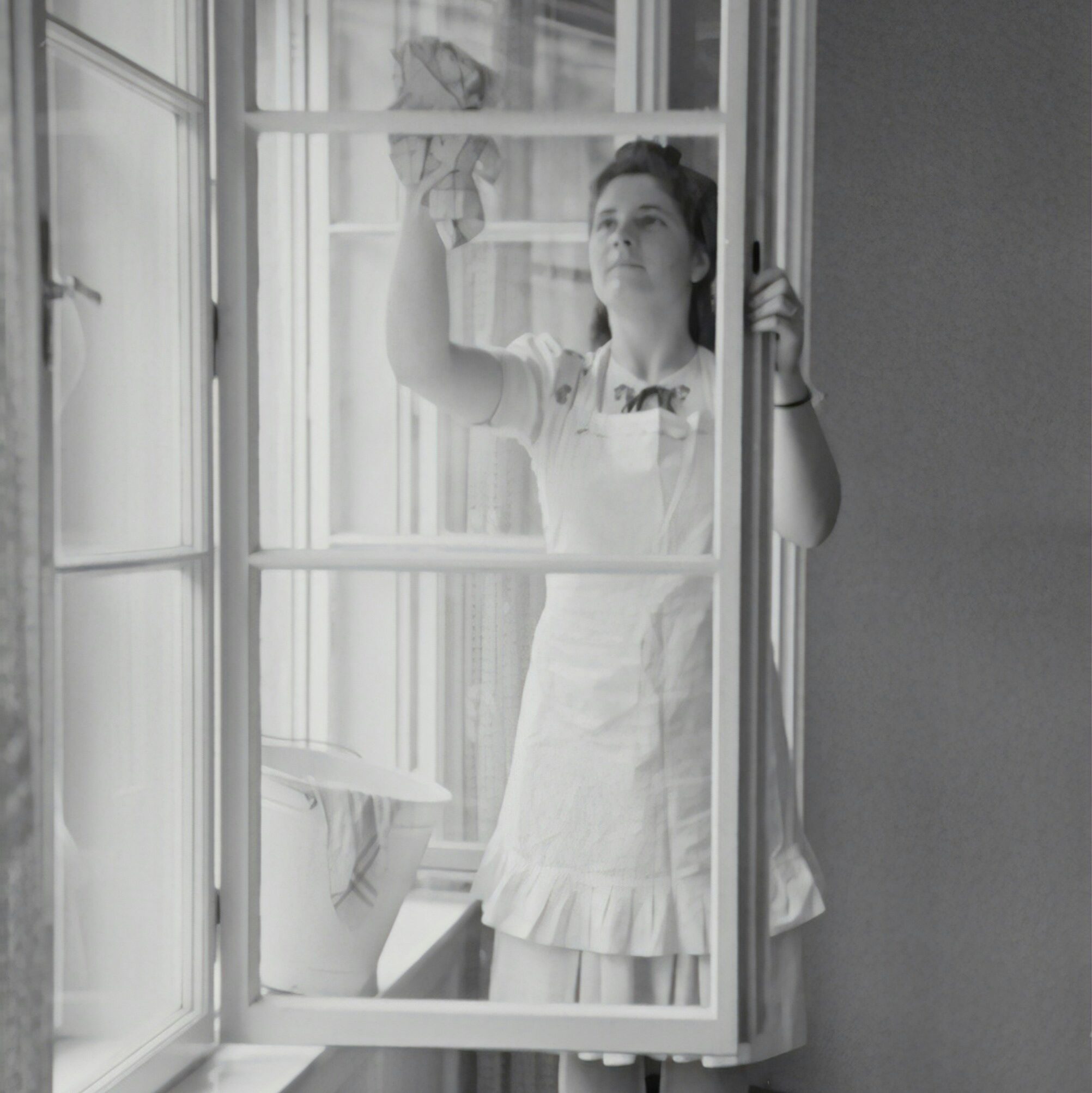
A while ago, we posted Sharing Household Chores: Part One of Two, which is about the value and meaning of housework. If you feel stuck and unmotivated to even try to get your household chores under control, take a look at that post first. You’ll read why housework is basically the most important work there is and the foundation of our entire society. Very motivating.
This post is more about the practical side of housework. How do you divide it up? When do you do it? What are the best tools and methods to use in different rooms of the house? How do you keep everyone motivated to do their part? If you’re ready to put together a plan for getting and keeping your house clean, this is the post for you.
Dividing up the Work
In the last post, we talked about how someone needs to be in charge. Your household needs a Chief Homemaking Officer, and the most likely candidate is you. You are probably the one who cares most about your home’s cleanliness and organization. You probably have more skill, more time, and more experience in this area than anyone else in the family. Can your husband fill this role? Probably. But, especially if you’re a stay-at-home mom, you’re more likely to have the time and motivation for this job, since you spend most of your day surrounded by it.
Chore Charts?

I’ve had great success with chore charts, and I’ve had chore charts that never even made it from the computer screen to the printer. I do think that, in general, they’re the best tool to help families keep track of who’s doing what and when. And they don’t have to be complicated. Here are some of my top tips for creating and managing chore charts:
Think long-term vs. a daily or weekly rotation
Children need time to develop the skills necessary to master complex tasks like sweeping, washing the table, loading the dishwasher, and making the bed. They also need time to settle into a routine. If you rotate chores too often, you risk frustrating a child who was really enjoying and making progress with a certain skill. You also risk driving yourself crazy trying to keep track of who’s doing what on any given day. I’ve had the most success with chore charts that assign the same chores to each person for several weeks or months at a time. Think about how long a training or probation period is at a new job. One month? Three months? Give your children enough time with their chore assignments to truly master those chores.
Train Them First
Speaking of training, be sure to spend individual time with each child demonstrating how to do each task. Then, give them time to practice while you supervise and provide (gentle) correction. Kids, even older kids, will have no idea how to properly wipe off a table or vacuum a rug if you’ve never shown them how to do it. Be very slow and deliberate with every motion you make as you demonstrate. Your kids will try to do everything at warp speed, so showing it slowly will result in a better understanding and a better end result.
Don’t Underestimate What They Can Do
Don’t assume that any chore is too easy or too hard for a child based on his or her age. Even very young children who have just learned to walk can learn how to do simple, helpful jobs. If you’re looking for a guide to chores by age, take a look at Montessori charts like this one.
Fair, Schmair
Try your best to be fair with the chore assignments, but don’t obsess over it. If someone has one more chore than someone else, or if one child seems to have more difficult or time-consuming assignments than another, consider it to be a good life lesson for everyone involved. Assure everyone that eventually, the chore assignments will change, and everything will even out in the end.
Write it Down
Document your chore assignments and post them somewhere. It’s just too much information to try to keep in your brain. There are a bunch of really cute ideas out there for how to design and use chore charts, but it also works to just write them out on a piece of paper and tape them to the fridge. If you do go with something more elaborate, you’re probably going to be the only person in the family who appreciates it or uses it properly.
How to Choose Daily, Weekly, and Monthly Chores
I’m a big fan of delegating daily chores, simply because they’re easier to remember and make a part of the family’s routine. Most of the chores I give my kids (when I’m organized, that is) are daily chores. Some of them, like setting the table or loading the dishwasher, are time-sensitive. So, I choose those times (usually before or after meals) to ask the other kids to do their (non-time-sensitive) chores as well. While one person is sweeping the floor after lunch, someone else can be vacuuming the living room, and another person can be putting away laundry. That makes keeping track of who’s done what a lot easier.
Daily Chores
Some examples of daily chores are:
Doing the dishes (breakfast, lunch, and dinner)
Setting and/or wiping off the table (breakfast, lunch and dinner)
Sweeping the floor (breakfast, lunch, and dinner)
Wiping down the toilets and bathroom sinks
Vacuuming the living room
Making your bed
Picking up your bedroom (usually sometime after dinner and before bed)
Picking up the homeschool room and/or material (usually after school)
Putting away laundry
Loading and folding laundry
Watering the garden
Weekly Chores
As with the daily chores, I like to have everyone do their weekly chores at the same time, just so I know they’ll actually get done. Saturday mornings are good, as are weekday afternoons (one of the perks of homeschooling). Some examples of weekly chores include:
Vacuuming your bedroom
Dusting your bedroom
Cleaning windows, doors, and TV screens
Dusting common spaces (living room, den, kitchen)
Mopping the floors
Scrubbing the toilets
Scrubbing the showers/tubs
Yard work – mowing, pulling weeds
Watering house plants
Monthly Chores
I’m going to admit something: I don’t actually have a monthly chore list. Everything that we don’t do daily or weekly just gets done when I realize that it’s filthy. I would like to say that I do things like change everyone’s bedding, or wipe down the walls and doors, every month, but I don’t. I do it when I notice that someone’s pillowcase is stinky, or I find a booger on the wall.
Occasional (Possibly Paid) Chores
Once in a while, one of my kids wants to buy something really, really badly. It just can’t wait till a birthday or Christmas, and they’re even willing to do work to earn some money. For these occasions, I have a special list of more difficult, time-consuming chores. Make sure you set very clear expectations up front about the job you assign and the amount of money you’re willing to pay. I have stopped asking my kids to pick “a full bag” of weeds for cash because we just can’t seem to agree on what a full bag means, even if I pick out the bag and demonstrate the level of fullness I’m looking for. Some of these paid chores include:
Washing the car (interior and/or exterior)
Wiping down the kitchen cupboards (interior and/or exterior)
Vacuuming the crevices of the furniture and/or cleaning it with leather conditioner
Polishing wooden furniture
Cleaning the garage floor
Washing the walls and baseboards

Rewards and Consequences
One thing I’ve learned about myself over the last 20 years is that I am not capable of keeping track of things like allowance and rewards. I can either do immediate rewards (“Oh, you finished your book! Here’s a piece of gum!”) or no rewards at all (“Great job, dear! Doesn’t it feel good to get that done? That’s its own reward, isn’t it?”). I also resort to bribery (I call them incentives). If I offer someone a dollar to do something for me, it usually gets done. Fast. If you want to use rewards, keep it as simple as possible. Maybe the whole family gets pizza on Friday night if everyone’s caught up on their chores.
The easiest consequence at my house for not getting your chores done is that you don’t get to do anything else (i.e., go on any electronics or play with your toys) until the chores do get done. Again, I have to keep it simple, or I know (and my kids know) that I’m not going to follow through with it.
Best Tools for Cleaning with Kids
Have you ever had a child suck up the cord of the vacuum into the vacuum and nearly destroy it? I have. When your kids help with chores, they will have a learning curve, and your equipment needs to be built to survive that period of time. The best tools for your kids to use are going to be:
Lightweight
Lightweight: Choose a vacuum, in particular, that isn’t heavy. If it’s too hard to move, the job will be frustrating and won’t get done properly.
Non-Toxic
Non-toxic: Kids will spray anything in a spray bottle everywhere they can. Including on themselves and their siblings. My favorite cleaner is a mixture of vinegar and water, which won’t hurt anyone unless maybe it’s sprayed directly in their eyes. You can use it on almost anything. I usually mix 1 part vinegar with 3 parts water.
Inexpensive
Inexpensive: Tools will get broken. Cleaners will get spilled or sprayed excessively. Don’t invest too much money until your kids get some training and experience under their belts.
Reusable
Reusable: Whenever possible, I have my kids use cloths instead of paper towels. I do let them use disinfectant wipes, but I usually hand them the number of wipes I expect them to use to get the job done. Otherwise, a whole roll disappears in minutes.
Adjustable or Child-Sized
Adjustable or child-sized: I have a broom that’s adjustable so my younger kids can still use it. I also have a couple of stools we use when they do dishes or need to reach high places.
Fun
Fun: My kids really love Sprayway window cleaner (not sure if that’s non-toxic OR inexpensive, but it’s proven to be worth it). They also love this little green vacuum I found at the thrift store for $5. Scrub Daddies are another favorite. Whenever I can, I get fun tools that give us all a little bit more motivation and enjoyment.
If you want to know more about my favorite cleaning tools, take a look at this post: Best Cleaning and Organizing Tools for Large Families.
What About Husbands??
Your husband also needs to understand how important his role is in the upkeep of your home. Some men are more interested in how they can contribute than others. My husband is extremely sensitive to what needs to get done at home, and he makes keeping the house clean and orderly a priority. I basically just let him fill in when and where he thinks he’s needed, and that works for us. He does most of the mowing, he takes the trash to the curb, and he does his fair share of the laundry. If he sees a doll on the floor, he picks it up before the dog chews its leg off. He makes the coffee in the morning and takes the dog out about 75 times a day. Once in a while, he even tries to make our bed.
Figure Out Where He Fits In
If you aren’t having a problem with your husband helping out around the house, I don’t think you need any formal chore assignments. However, if it is a problem, you need to TALK ABOUT IT right away and figure out a plan together. Maybe he can officially be in charge of all of the yard work. Maybe he can make dinner a few nights a week. My husband does a lot of the bedtime stuff at our house – making sure everyone gets their pajamas on and brushes their teeth and tucking them into bed. Maybe your husband can take on the nighttime duties with the kids and you can take the mornings.
Work with your husband’s strengths, his schedule, and his interests to figure out where he fits into your chore system. Just make sure that you fit him in somewhere. Both of you need to know that he’s a valuable contributor to the maintenance of your home.
It’s Your Home!
The most important thing to remember as you figure out how to manage your home is that it’s YOUR home. These are my ideas, and they’ve worked well for me for a long time, but they might not all work for you. That’s okay! My hope is to give you a place to start; to help you move forward on the path to a cleaner, calmer home. The end goal here is to make your home a place where your family feels loved, guests feel welcome, and you feel at peace. That might mean you dust the ceiling fans once a week, or it might mean you only do it when they start raining dust bunnies onto the dinner table.
Do you have any tips for handling chores? Share them in the comments below!


